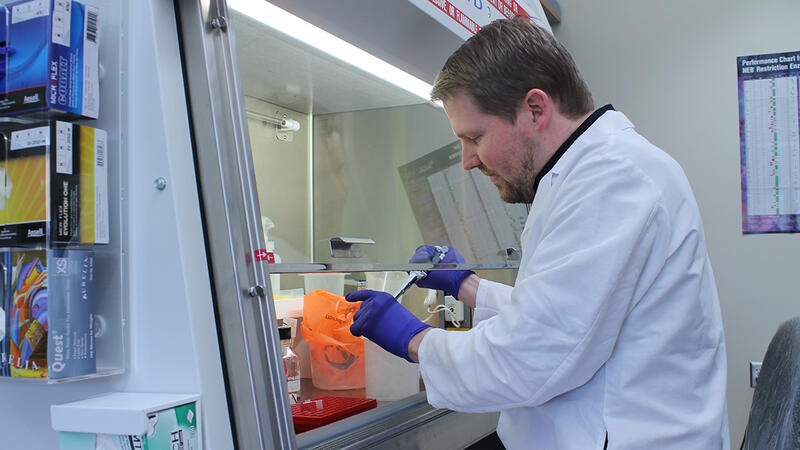News
Sustainable Biomass Conversion
Genetic toolkits boost biofuel production
Microbes devour plant material, like leaves and stems from native plants, and convert it into biofuels and bioproducts. But in the process, the deconstructed plant material releases toxins that get in the way, creating one of the challenges to making biofuels an efficient and economical alternative to existing fuels. GLBRC co-investigator Jason Peters and his team are building tools to help make the microbes more resilient.
GLBRC researchers at Michigan State University are racing to build climate-resilient crops before global food systems reach a breaking point.
GLBRC scientists used computer modeling to simulate the movement of every atom in the system to better understand how lignin molecules behave in various organic solvents and how the dissolved lignin building blocks interact with catalyst surfaces. The results showed that some organic solvents are more effective than water at dissolving lignin, causing the molecules to spread out more and increasing the area accessible to interact with the catalyst.
Brayan Riascos Arteaga is a third year PhD student in the Department of Civil and Environmental Engineering. He works in the Noguera lab, where he’s developing ways to utilize manure fibers as a lignocellulosic resource.
Making fuels and other products from plants requires treating the plant fibers to break apart sugars and other parts of the plant cell wall. The leftover liquid (or liquor) from the process must be treated to remove hazardous compounds before it can be safely thrown away. Therefore researchers have explored reusing spent liquor or extracting the organic compounds for use as fuels or industrial chemicals. Here, researchers identified phenolic compounds, a group of ring-shaped aromatic molecules, in spent liquor from a pretreatment process using ammonia dissolved in water.
With a doctorate in biophysics and more than a decade of experience in career and professional development, Alexandra Schnoes is uniquely qualified for her new position as workforce development manager at the Great Lakes Bioenergy Research Center. We talked to her about her own career path and her vision for recruiting, retaining, and training the next generation of GLBRC scientists.
Great Lakes Bioenergy Research Center Science Director Federica Brandizzi has been appointed director of the prestigious Plant Research Center at Michigan State University.
GLBRC scientists worked with partners at the Center for Advanced Bioenergy and Bioproducts Innovation (CABBI) and the Joint BioEnergy Institute (JBEI) on an investigation into how different pretreatment methods affect production of fuels and chemicals from sugarcane.
Using a process called adaptive laboratory evolution, scientists found that a single genetic change allows N. aromaticivorans to digest acetovanillone, an aromatic compound in biomass that most studied microbes can't digest. DNA analysis predicts that many other bacteria use similar proteins to digest this and other related aromatic compounds.
Through genetic engineering, scientists can create strains with entirely new features, such as plants that produce certain chemicals or that store more energy in sugars that are easier for microbes to turn into biofuels. Making these changes without affecting how the plant grows requires controlling when and where certain genes are turned on and off. Despite progress, there are still hurdles to designing and using these genetic tools to precision engineer crops grown for energy.
What started as a last-minute contest entry for a group of Michigan State University students has resulted in a journal publication and a better understanding of how to translate science into marketable solutions to real-world problems.





